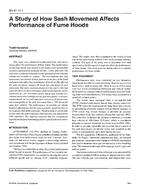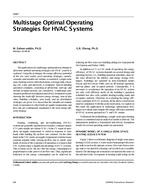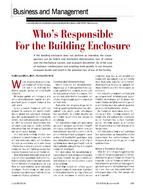A thermal comfort index relates the thermal environment and the human response. The relation is affected by errors in the measurement and formulation of the index. The correlation coefficient between the values of the index and the subjective response is reduced by both kinds of error. Constant errors reduce the regression coefficient when the variance of the index is small, proportional errors reduce the coefficient equally at all variances, while higher order errors reduce the coefficient if the variance is large. These effects are illustrated using the ASHRAE database of field study thermal comfort observations. Measurement and formulaic error are shown to have a profound effect on index behavior. A complex index may yield a regression coefficient of about half the true value. A modified procedure is suggested for obtaining thermally neutral temperatures from field study data.
Units: SI
Citation: Symposium, ASHRAE Transactions, vol. 106, pt. 2
Product Details
- Published:
- 2000
- Number of Pages:
- 10
- File Size:
- 1 file , 390 KB
- Product Code(s):
- D-7249


